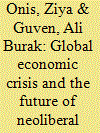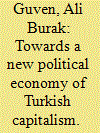| Srl | Item |
| 1 |
ID:
108961


|
|
|
|
|
| Publication |
2011.
|
| Summary/Abstract |
This article outlines the main elements of rupture and continuity in the global political economy since the global economic crisis of 2008-2009. While the current calamity poses a more systemic challenge to neoliberal globalization than genetically similar turbulences in the semi-periphery during the 1990s, we find that evidence for its transformative significance remains mixed. Efforts to reform the distressed capitalist models in the North encounter severe resistance, and the broadened multilateralism of the Group of 20 is yet to provide effective global economic governance. Overall, neoliberal globalization looks set to survive, but in a more heterodox and multipolar fashion. Without tighter coordination between old and emerging powers, this new synthesis is unlikely to inspire lasting solutions to pressing global problems such as an unsustainable international financial architecture and the pending environmental catastrophe and may even fail to preserve some modest democratic and developmental gains of the recent past.
|
|
|
|
|
|
|
|
|
|
|
|
|
|
|
|
| 2 |
ID:
190689


|
|
|
|
|
| Summary/Abstract |
Political economists investigating Turkey's turbulent path in recent years predominantly work from within three different characterizations of Turkish capitalism: authoritarian neoliberalism, crony capitalism, and state capitalism. This article critically reviews these competing visions and identifies directions for future research. I argue that, fundamental differences aside, these approaches together illustrate the indispensability of a political economy perspective for comprehending Turkey’s current predicament, in particular its authoritarian turn and ongoing systemic crisis. Yet meeting the potential of this research program also requires resisting rigid macro conceptualizations and aiming instead for empirically rich analyses of nuts-and-bolts phenomena such as changes in the class map, sectoral regimes, and challenges of development, with a view to identifying feasible strategies of renewal post-AKP.
|
|
|
|
|
|
|
|
|
|
|
|
|
|
|
|